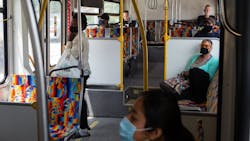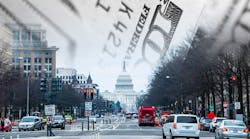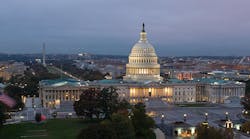CA: Editorial: Don't let the coronavirus destroy public transit too
By The Times Editorial Board
Source Los Angeles Times (TNS)
Who's riding the bus in a pandemic? A lot of people, it turns out.
The Los Angeles County Metropolitan Transportation Authority normally carries about 1.2 million passengers a day. Ridership is down by half, but some 550,000 people are still boarding the region's buses and trains daily. The vast majority are workers who rely on public transit to reach their jobs.
But this essential service for essential workers is threatened. Transit agencies in California and across the nation are hemorrhaging money. The pandemic-induced shifts to remote work and distance learning, combined with the closures of many businesses, have cost transit systems dearly in terms of riders and the fares they pay. In communities that rely on sales taxes to fund public transit, that revenue also has declined with the economic downturn.
Meanwhile, agencies are forced to spend more money to make sure buses and trains are safer for riders, including cleaning more frequently and operating at decreased capacity so riders can distance themselves from one another. With less revenue and more expenses, transit agencies are getting desperate, and many wonder if they can stay in business.
Metro is among the transportation agencies pleading with lawmakers to provide more emergency funding so they can continue running through the pandemic and recovery. The groups are seeking $32 billion for transit agencies nationwide, with $3 billion earmarked for California.
Republicans in Congress and the White House are balking at another big pandemic relief bill, having supported a succession of bipartisan bills in February and March that appropriated roughly $3 trillion. And you know what? Despite Republicans' newfound concerns about the deficit, the reality is the federal government hasn't spent enough to prevent lasting harm to the nation's essential public services.
The last of the measures passed by Congress in March, the Coronavirus Aid, Relief and Economic Security Act, included about $25 billion for transit agencies across the country. That provided short-term relief to prevent agencies from shutting down service. But for Metro and other large transit agencies, the money will be gone in a few months — and the pandemic won't be.
Metro CEO Phil Washington estimates his agency will lose $1.8 billion by next July because of the declines in sales tax, fare revenue and advertising income. The agency has already stopped running some bus lines and switched most bus and rail routes to less-frequent service to save money. It's also planning to delay some construction projects.
Likewise, Metrolink, the region's commuter rail system, saw ridership drop a stunning 90% during the pandemic. As it turns out, many of Metrolink's riders are office workers who can do their jobs from home. Now Metrolink has to figure out how to bring those passengers back — the system had its highest ridership ever last year — and what this means for the agency's ambitious program to expand service and switch to zero-emission trains.
There's a real concern that, as the pandemic drags on and transit agencies' losses pile up, their systems could fall into a death spiral. Agencies would be forced to cut service and sacrifice even more riders, which would further reduce revenue and trigger more cuts. The biggest losers would be the most vulnerable, including low-income workers, the disabled, students and other who rely on transit.
The risk is that when COVID-19 is eventually under control and people can return to some version of normalcy, there won't be a convenient, reliable transit system available to serve them. That would cause the public to lose faith in the value of public transit. Indeed, voters in California have repeatedly backed tax measures to expand mass transit and give people climate-friendly alternatives to driving. The pandemic and its economic fallout have upended all those plans, and that poses a serious threat to California's climate change goals.
This isn't just a California issue or a big-city problem. The transportation sector is one of the primary sources of greenhouse gases — in fact, the largest in California — and pre-pandemic emissions were on the rise despite the advent of vehicles that burn less fuel per mile. California and its major cities have been committed to building more robust transit services and transit-friendly communities so people could ride instead of drive.
And as we're seeing today, workers who are vital to a functioning economy rely on bus and train service to get to their jobs. As bad as the recession is now, it would be considerably worse if those services collapsed. California and the U.S. have wisely invested in public transit. We cannot let COVID-19 undermine the vision for a modern, fast, clean and equitable transportation system.
___
(c)2020 the Los Angeles Times
Visit the Los Angeles Times at www.latimes.com
Distributed by Tribune Content Agency, LLC.






